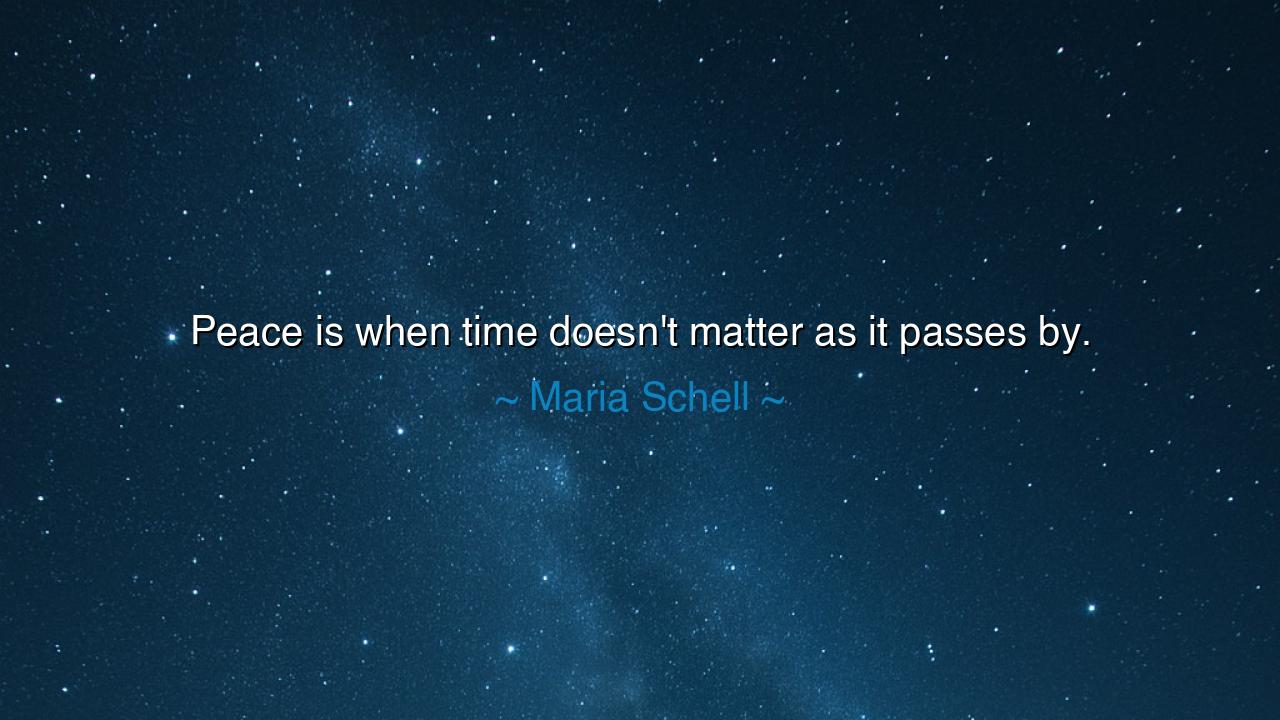
Peace is when time doesn't matter as it passes by.






Maria Schell, the luminous actress whose presence graced both stage and screen, once uttered words that reach beyond art into the soul itself: “Peace is when time doesn’t matter as it passes by.” In this simple yet profound reflection, she reveals the essence of true serenity. For when the heart is restless, every moment drags with weight, each second measured and judged. But when the spirit is at ease, time loses its chains—hours flow like a river, unnoticed, uncounted, yet deeply lived. Peace, then, is not merely the absence of conflict, but the transcendence of time’s tyranny.
The origin of this wisdom is rooted in Schell’s own life, which was marked by both artistic triumphs and personal trials. In the world of performance, time is rigid—curtains rise, cameras roll, schedules demand obedience. Yet beyond this relentless structure, she glimpsed another truth: that the soul finds its rest when time itself fades away, when one is fully immersed in the present moment. Her words echo the ancient wisdom of sages who taught that eternity is not found in endless duration, but in the depth of a single moment fully embraced.
History, too, confirms this truth. Consider the monks of Mount Athos or the desert fathers of early Christianity, who retreated into silence and prayer. To them, hours passed unnoticed, for their souls were anchored in peace. Contrast this with the trenches of the First World War, where each minute felt like an eternity, as fear gnawed at the heart. Here we see the duality of human experience: when fear or unrest rules, time becomes a prison; when peace reigns, time becomes a gentle river in which one floats freely.
Philosophers have often spoken of this state. Augustine of Hippo wrote of the soul’s restlessness until it finds rest in God, at which point the burden of time dissolves. Likewise, the Buddha spoke of the timeless moment achieved in enlightenment, where the cycle of craving and suffering no longer binds the mind. Maria Schell’s reflection, though born in the modern world, resonates with these ancient truths: peace is timelessness, the liberation from measuring life in anxious increments.
On a more earthly plane, we see this in the lives of lovers reunited after long separation, who lose all sense of time in each other’s presence. Or in the artist, wholly absorbed in creation, for whom hours slip away unnoticed. Such moments remind us that peace is not only the great treaties of nations, but the quiet union of the self with what it loves most. When you are at peace, you no longer ask, “How much time has passed?” for you are too busy living.
The lesson here is radiant: seek not simply more hours, but better ones. Do not measure your life by clocks alone, but by the depth of your presence in each moment. If your days are filled with anxiety, time will weigh heavily; if your days are filled with peace, time will vanish into joy. The greatest wealth is not found in adding years, but in learning to dwell so deeply in the present that time itself bows before your serenity.
Practically, this means cultivating habits that draw you into the present: meditation, prayer, attentive listening, or simple gratitude for what is before you. It means shaping a life where moments of stillness are treasured, where the soul is allowed to rest. Step away from haste, resist the tyranny of constant urgency, and learn to sit with life as it is. In doing so, you will taste the truth of Schell’s words: that when peace fills the heart, time no longer matters.
Thus, Maria Schell’s voice joins the chorus of wisdom across the ages: “Peace is when time doesn’t matter as it passes by.” Let us take her insight as a guide, remembering that peace is not found in length of days, but in depth of living. For when the heart is whole, when the spirit is untroubled, the hours flow unnoticed—and life, however long or short, becomes eternal in its beauty.






AAdministratorAdministrator
Welcome, honored guests. Please leave a comment, we will respond soon